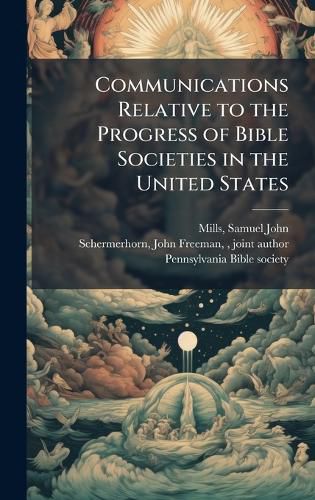Readings Newsletter
Become a Readings Member to make your shopping experience even easier.
Sign in or sign up for free!
You’re not far away from qualifying for FREE standard shipping within Australia
You’ve qualified for FREE standard shipping within Australia
The cart is loading…






Communications Relative to the Progress of Bible Societies in the United States offers a fascinating glimpse into the burgeoning Bible society movement in early 19th-century America. Authored by Samuel John Mills and John Freeman Schermerhorn, along with contributions from the Pennsylvania Bible Society, this historical document provides insights into the establishment and expansion of organizations dedicated to distributing the Bible.
Detailing the efforts to spread religious literacy and promote Christian values, this work sheds light on the social and religious landscape of the young nation. This document is invaluable for researchers and historians interested in religious movements, American history, and the role of Bible societies in shaping the cultural and spiritual identity of the United States.
This work has been selected by scholars as being culturally important, and is part of the knowledge base of civilization as we know it. This work was reproduced from the original artifact, and remains as true to the original work as possible. Therefore, you will see the original copyright references, library stamps (as most of these works have been housed in our most important libraries around the world), and other notations in the work.
This work is in the public domain in the United States of America, and possibly other nations. Within the United States, you may freely copy and distribute this work, as no entity (individual or corporate) has a copyright on the body of the work.
As a reproduction of a historical artifact, this work may contain missing or blurred pages, poor pictures, errant marks, etc. Scholars believe, and we concur, that this work is important enough to be preserved, reproduced, and made generally available to the public. We appreciate your support of the preservation process, and thank you for being an important part of keeping this knowledge alive and relevant.
$9.00 standard shipping within Australia
FREE standard shipping within Australia for orders over $100.00
Express & International shipping calculated at checkout
Communications Relative to the Progress of Bible Societies in the United States offers a fascinating glimpse into the burgeoning Bible society movement in early 19th-century America. Authored by Samuel John Mills and John Freeman Schermerhorn, along with contributions from the Pennsylvania Bible Society, this historical document provides insights into the establishment and expansion of organizations dedicated to distributing the Bible.
Detailing the efforts to spread religious literacy and promote Christian values, this work sheds light on the social and religious landscape of the young nation. This document is invaluable for researchers and historians interested in religious movements, American history, and the role of Bible societies in shaping the cultural and spiritual identity of the United States.
This work has been selected by scholars as being culturally important, and is part of the knowledge base of civilization as we know it. This work was reproduced from the original artifact, and remains as true to the original work as possible. Therefore, you will see the original copyright references, library stamps (as most of these works have been housed in our most important libraries around the world), and other notations in the work.
This work is in the public domain in the United States of America, and possibly other nations. Within the United States, you may freely copy and distribute this work, as no entity (individual or corporate) has a copyright on the body of the work.
As a reproduction of a historical artifact, this work may contain missing or blurred pages, poor pictures, errant marks, etc. Scholars believe, and we concur, that this work is important enough to be preserved, reproduced, and made generally available to the public. We appreciate your support of the preservation process, and thank you for being an important part of keeping this knowledge alive and relevant.